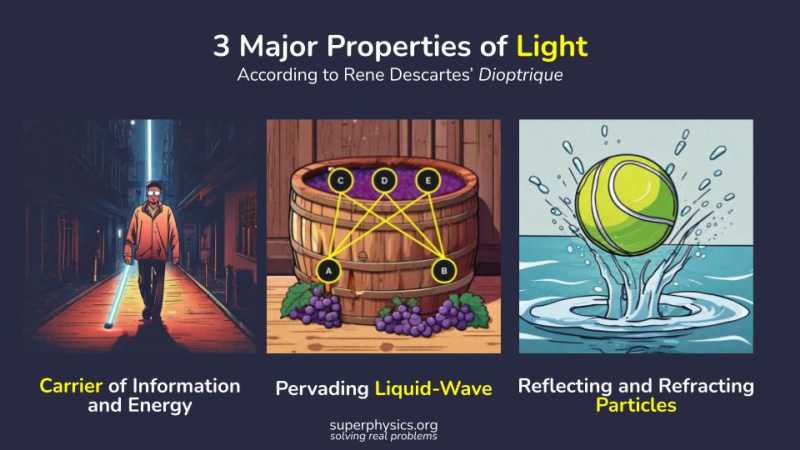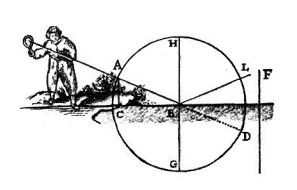Descartes and the Photo-Electric Effect and Double Slit Experiment
In 1637, Rene Descartes published La Dioptrique which explained the 3 properties of light as a carrier, fluid-wave, and as a ball.

- As a carrier, it transmits information such as colors, and energy such as heat.
- As a fluid-wave, it spreads in all directions.
- As a ball, it bounces and bends its path when hitting material objects.
In normal movement, light is a wave. But it becomes a particle whenever it hits something.
This is now seen in the double-slit experiment where the insertion of a filter converts electrons from waves into particles. The continued sending of particles then forms a wave pattern.
This destroys the idea that the act of observation collapses wave function.
Descartes’ analogy for light being a particle was a tennis ball hitting the water.

A tennis ball hitting the water can have 3 outcomes depending on the energy of the ball.
- It can be deflected if it has high energy (line ABL)
- It can go straight if it has medium energy (line ABD)
- Iit can sink down if it has less energy (line ABG)
This is now seen in the Photoelectric Effect credited to Einstein.
Einstein used the Photoelectric Effect to create the concept of quanta, which were the light balls to Descartes. Einstein then imbued the property of time on those quanta in order to create the theory of Relativity wherein light is used as a measuring rod.
To Descartes, this measuring rod property of light is a consequence of it being a carrier. In this case, light becomes a carrier of spacetime information.
The main difference between Descartes and Einstein is that Descartes’ spacetime has far more properties than what can be relayed or carried by light.
- One of these is material gravity (now called Newtonian gravity) and electromagnetic gravity (now called dark matter).
- Another is constant expansion, now seen as dark energy.
- Still another is the liquid properties of spacetime, now seen in gravitational waves.
So Cartesian Physics unites the Double-Slit Experiment with the Photoelectric Effect and Relativity while giving insights on spacetime through Galaxy Rotation and the Hubble expansion. All of these are done with a single principle that Electromagnetism has 3 inherent properties written in 1637.
Replacing Einstein
We want to discover Nature for how It really is, and not how some limited human minds see it. This is to fully use all of Nature’s features just as you want to use all the awesome features of your iPhone.
This is why we replace all of Einstein’s theories with Cartesian ones:
- General Relativity is replaced with Poincare. The bending is done by spacetime particles, not mass.
- Special Relativity is replaced with Lorentz. The relativistic effects is based on the difference between electromagnetism and spacetime
- Mass-energy equivalence is replaced with Lorentz and Poincare. All material objects have electromagnetism in them.
- The Photo-electric effect is replaced with Tesla. Light is a ball when it has enough energy.
- Einstein-Bose condensate is replaced with Bose. The removal of energy converts the electromagnetism in gas from a ball into a wave. This is simply the reverse of the Photo-electric effect.
- Brownian Motion is replaced with Kelvin. High energy causes the electromagnetism in matter to make the matter spread faster and gain gas properties.
These replacement theories remove the sophistry and blockages that Einstein put Physics in, so that the freed Physics will be in line with Nature, much easier to understand, teach, and develop technologies from (such as anti-gravity).